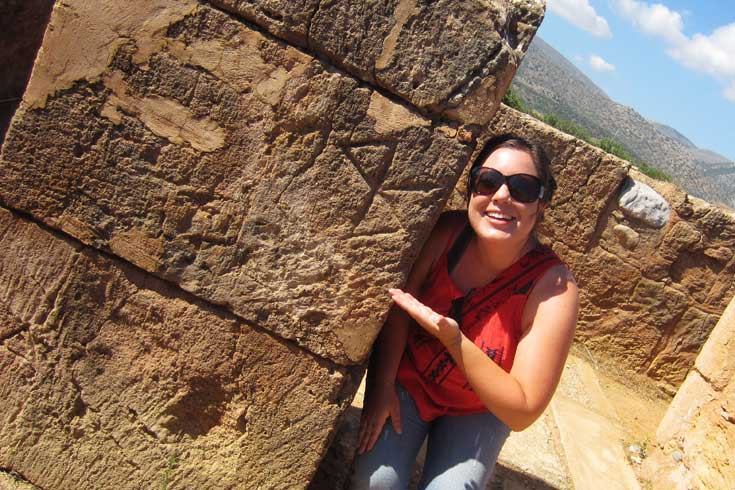Belisi Gillespie, MA'15, Pursues PhD at the University of California, Berkeley
 December 7, 2016
December 7, 2016
By Helen Wong | Graduate School of Arts and Sciences
As a University of Texas undergrad, Belisi Gillespie, MA'15, participated in an archaeological field school every summer. While pursuing a BA in Anthropology, she took as many classes related to archaeology as she could, and eventually added a minor in Classics. After graduation, she enrolled in the master’s of Ancient Greek and Roman Studies (AGRS) program at Brandeis, where she focused on digital applications to archaeological fieldwork—work that would prepare her to pursue a PhD at the University of California, Berkeley.
Having researched many master’s programs Belisi decided that Brandeis “offered everything that I was hoping for.” She met with the graduate directors before applying, which “made my decision so easy—they were wonderful!” Most importantly, she realized that the program would prepare her for further study in a doctoral program. “I felt like the program could both fill in remaining gaps in my classical studies education while also edifying my progress as a student in the discipline,” she says.
Belisi noticed the sense of close community in the AGRS program right away. “There was not one member of the faculty that did not extend their support and expertise at every opportunity,” she says. “They made it their priority to provide us with as many opportunities for teaching and learning as possible, and they acted as mentors in each of these capacities.” She also notes that “the other students were fantastic!”
There were many opportunities for research available at Brandeis. Among the most notable for Belisi were taking a course at MIT that focused on archaeological ceramic analysis, conducting archaeological fieldwork directly related to her area of interest, and working with one of the directors of the Center for Hellenic Studies in Washington, D.C. Her only regret is that there were so many avenues to pursue that “it was impossible to take advantage of all of them.”
Overall, the research training and close faculty mentoring are the elements of a Brandeis education that stick with Belisi. “The Brandeis faculty taught me the tools of the trade—and I couldn't survive without them now! I was also able to discover related avenues of research that I continue to explore now, new fields and new tools that I had had no introduction to before Brandeis, but that I can't imagine continuing without. In short, my time at Brandeis shaped the work that I continue to build upon at Berkeley.”
Belisi has maintained ties with the faculty members that she studied with at Brandeis, and she appreciates that they continue both to encourage and support her current research even though she has moved on to a leading doctoral program. “They really went above and beyond,” she says, “and I am still so grateful!”






